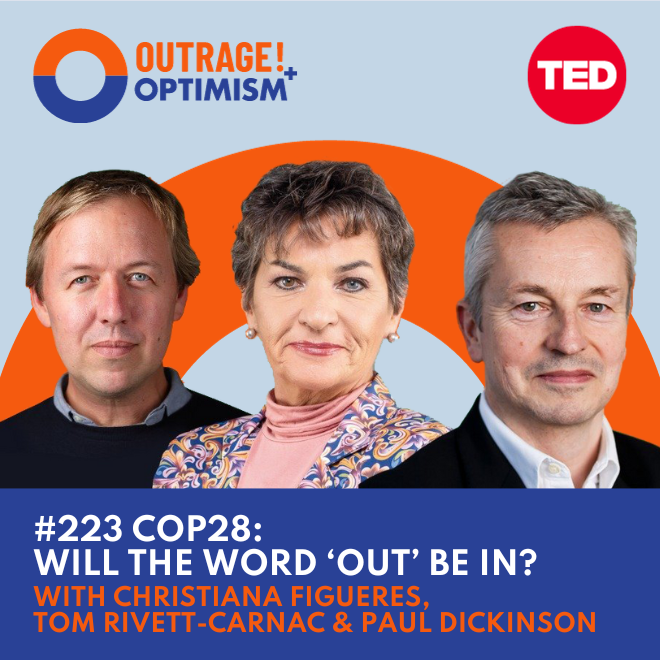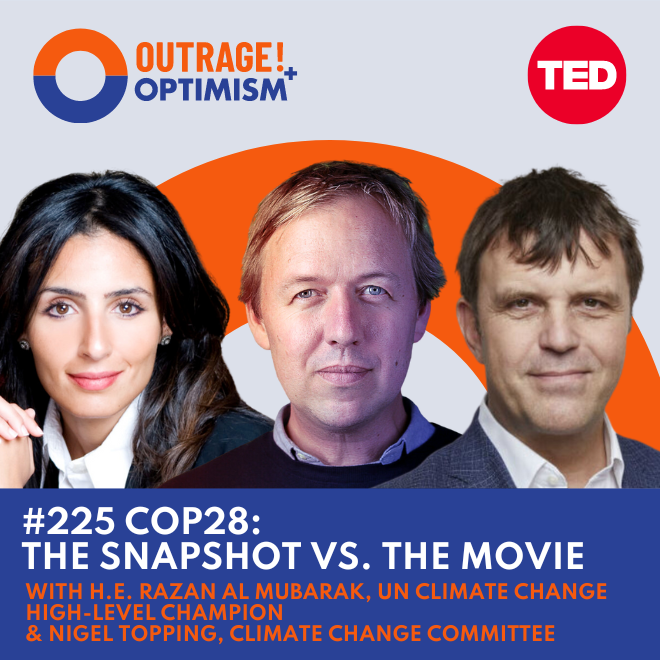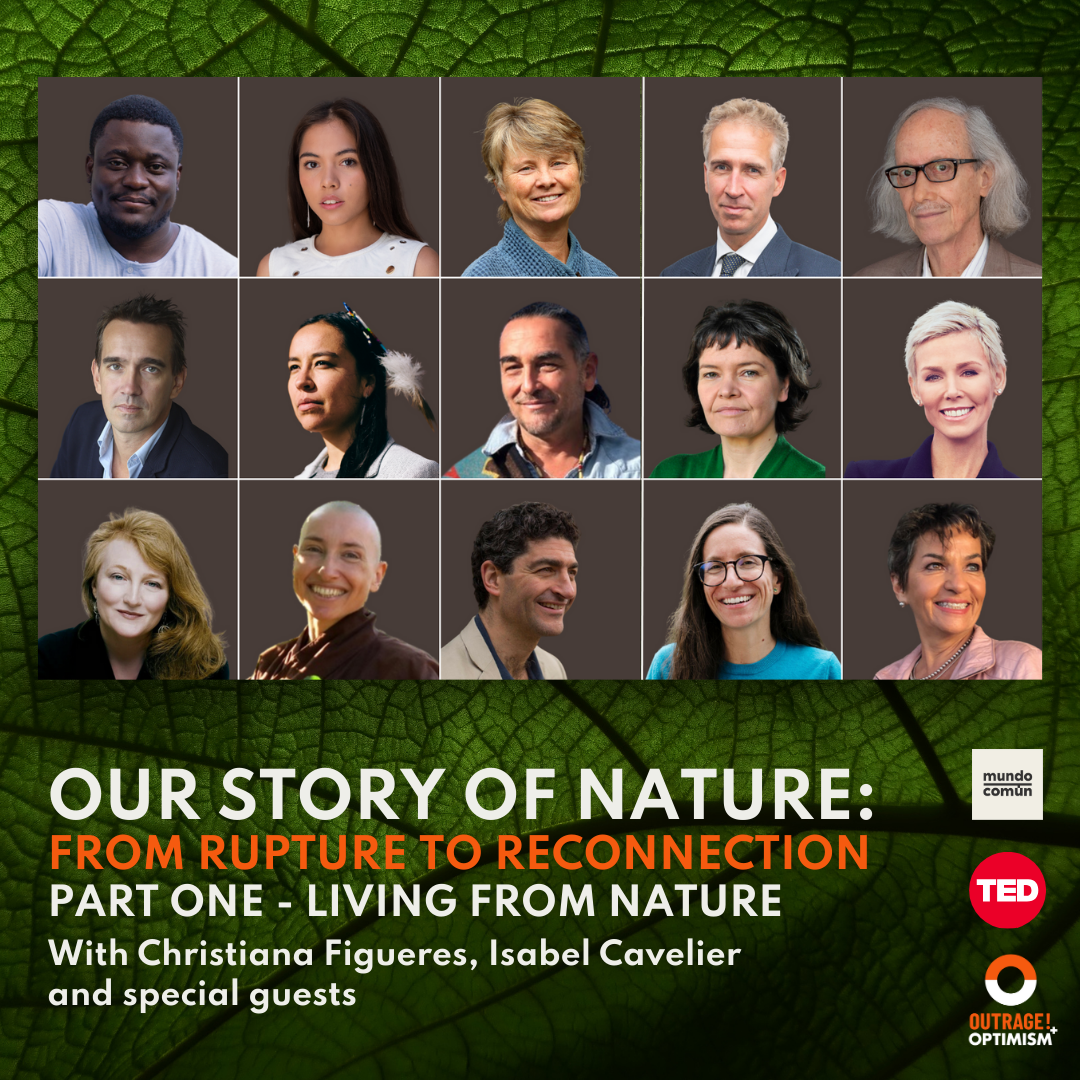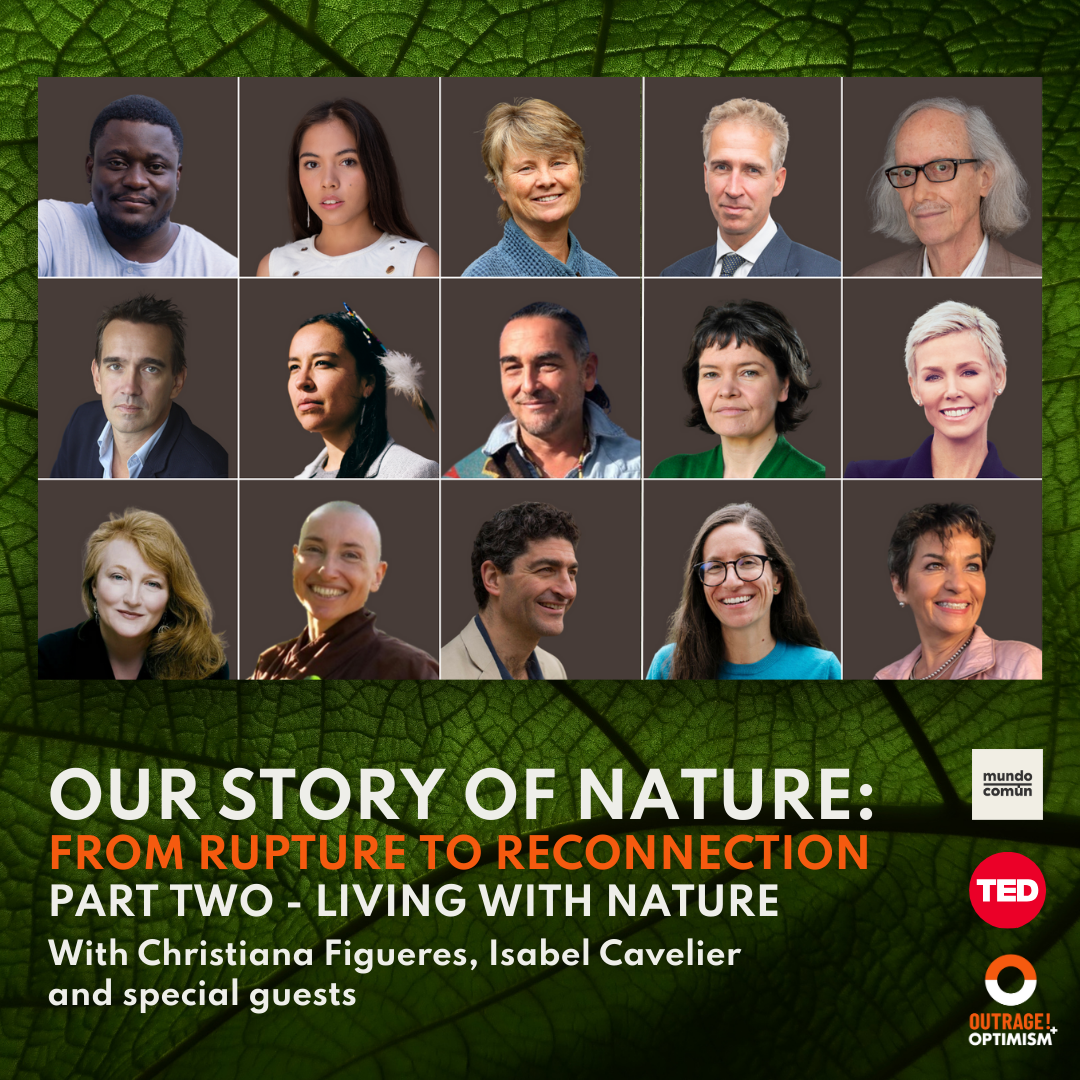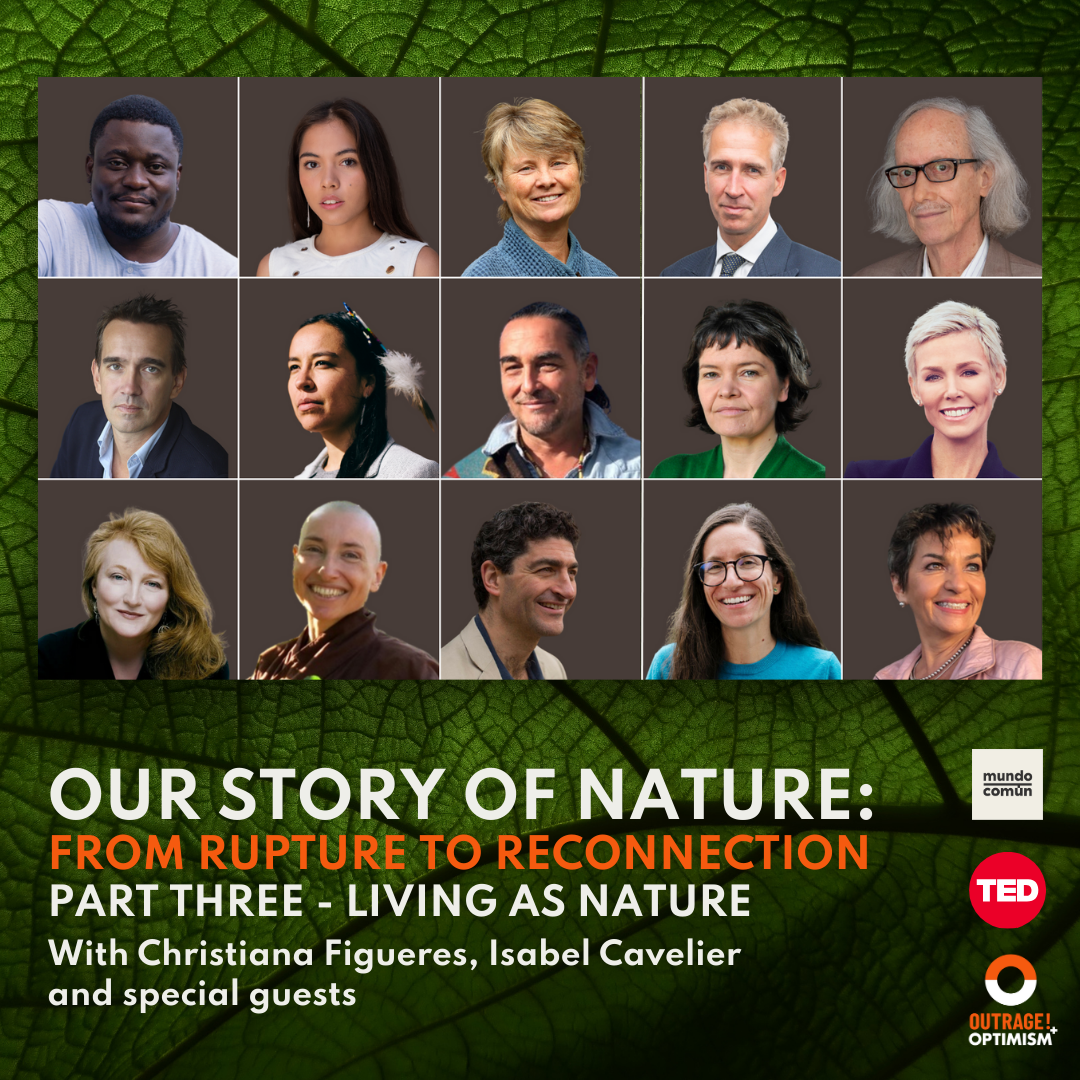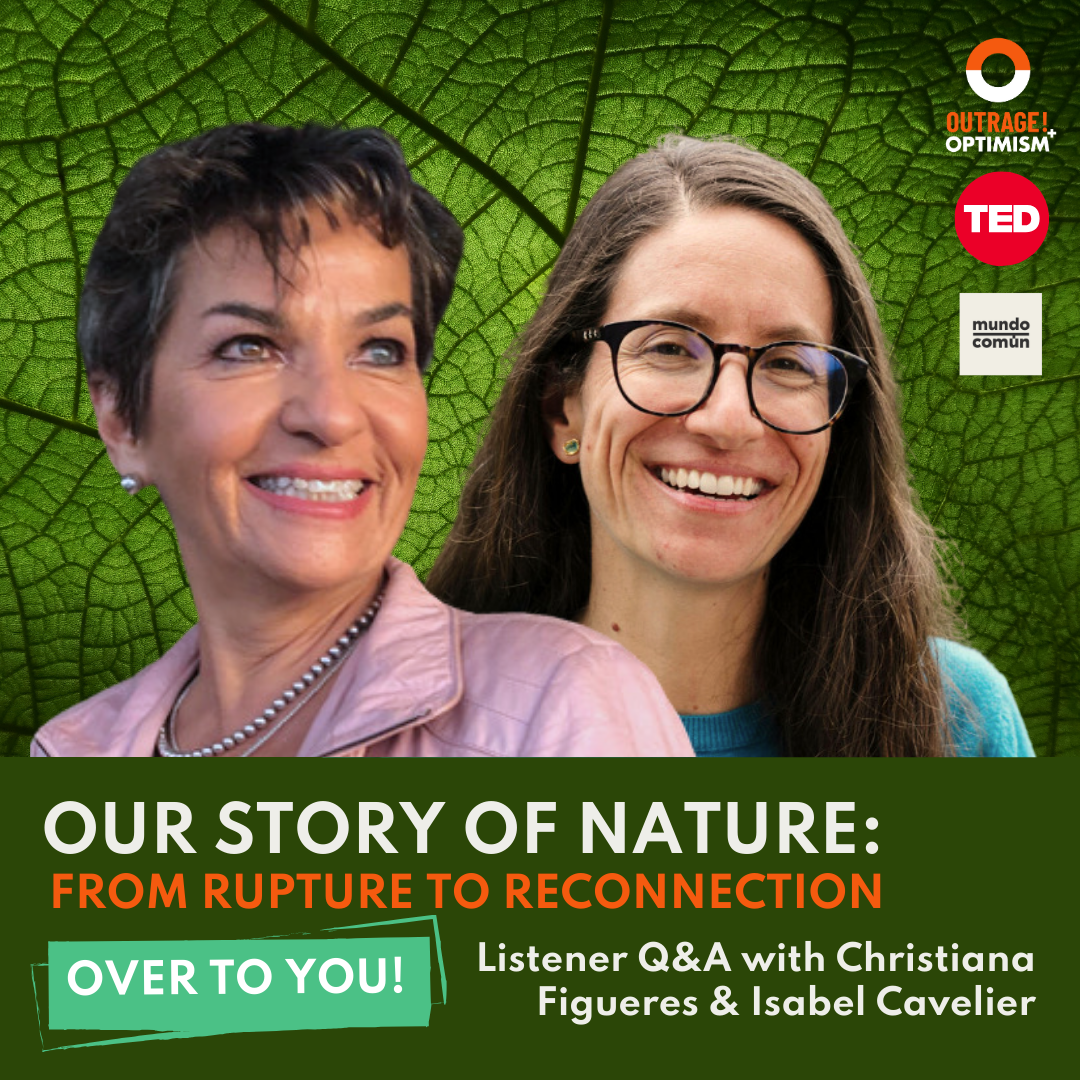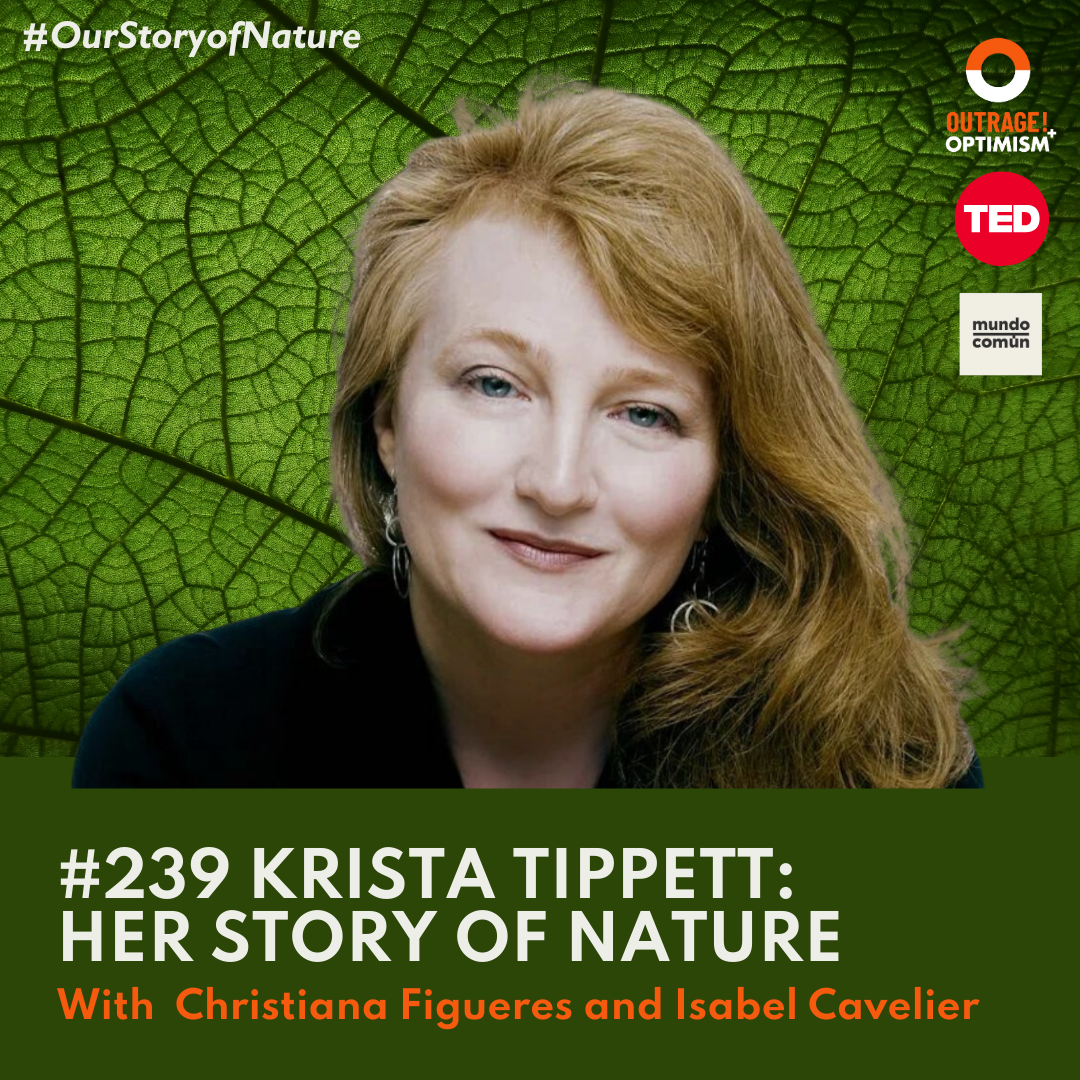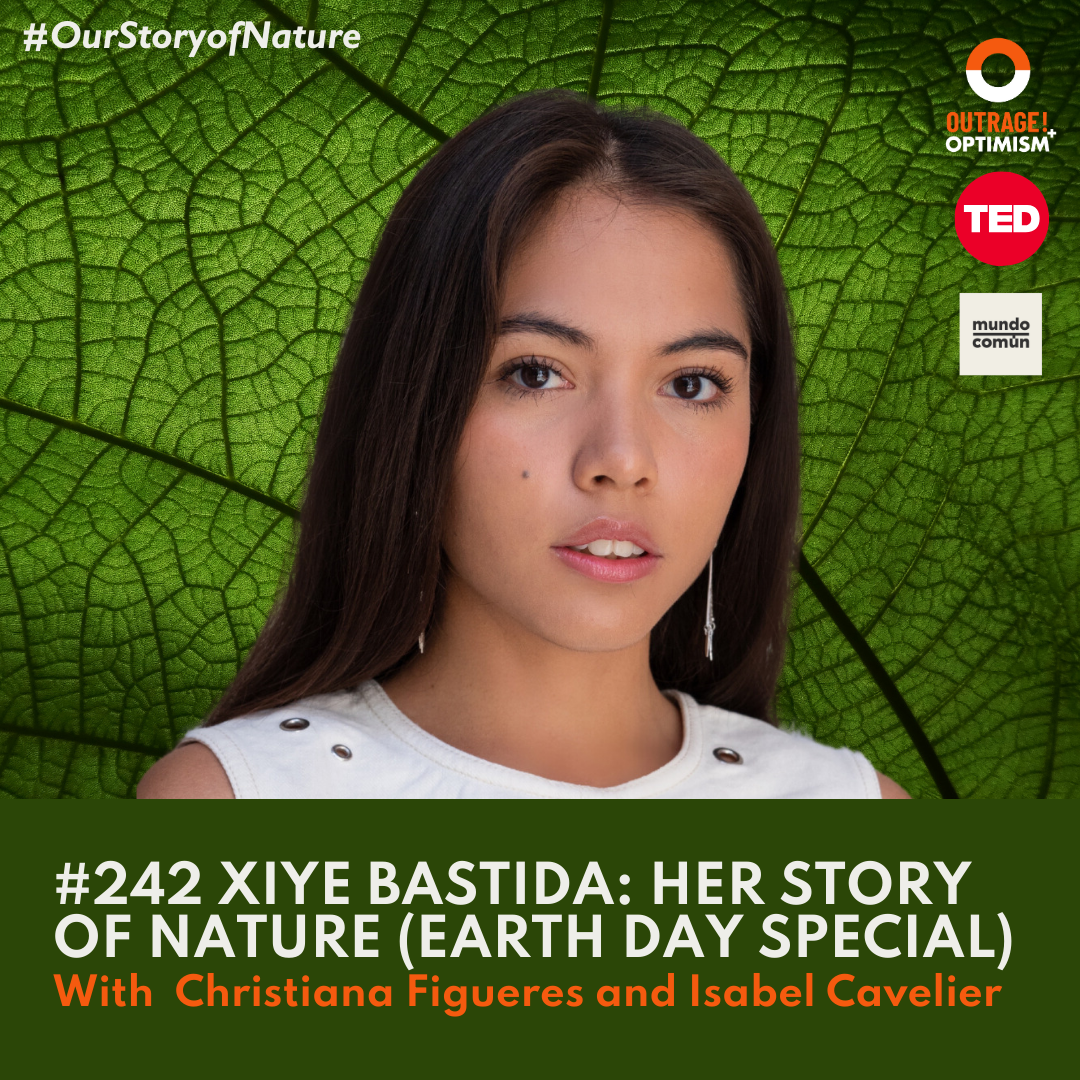224: COP28: Later is Too Late
About this episode
This week on Outrage + Optimism we bring you news that over 1000+ signatories from across business, finance, philanthropy, politics, academia and civil society have joined forces to call on Sultan Al Jaber and all Parties to deliver a 1.5C aligned outcome in response to the Global Stocktake - because later is too late!
Tom reflects on this huge concerted effort to deliver outcomes at COP 28 and speaks to Halla Tómasdóttir, CEO & Chief Change Catalyst at the B Team about her motivations to galvinise the B-Team behind this effort to call for meaningful action, and we also hear from many of the signatories themselves explaining why transformative action must happen now.
NOTES AND RESOURCES
Link to the website STATEMENT: THE TRANSFORMATION IS UNSTOPPABLE
Signatories featured in this episode:
Halla Tómasdóttir, CEO and Chief Change Catalyst, The B Team
LinkedIn
Andrew Steer, President and CEO, Bezos Earth Fund
LinkedIn
Mary Robinson, Chair, The Elders
LinkedIn
Racquel Moses, CEO, The Caribbean Climate-Smart Accelerator
LinkedIn
Tom Crowther, Lead Scientist and Lab Founder, Crowther Lab
LinkedIn
Jesper Brodin, CEO, INGKA Group | IKEA
LinkedIN
Sierra Quitiquit, CEO and Founder, Time for Better
LinkedIn
Catherine McKenna, CEO, Climate and Nature Solutions
LinkedIn
Sandrine Dixson-Declève, Co-President, Club of Rome
LinkedIn
Sharan Burrow, Former General Secretary of the International Trade Union Confederation
LinkedIn
María Fernanda Espinosa, Former President UNGA
LinkedIn
Johan Rockström, Director, Potsdam Institute for Climate Impact Research
LinkedIn
Gail Whiteman, Founder of Arctic Basecamp and Professor of Sustainability at the University of Exeter, Arctic Basecamp
LinkedIn
Ingmar Rentzhog, CEO and Founder, We Don't Have Time
LinkedIn
Matthew Phillips, Lead for Groundswell, Global Optimism
LinkedIn
Lord Adair Turner, Chair, Energy Transitions Commission
Xiye Bastida, Activist, Co-Founder, Re-Earth Initiative
LinkedIn
Vanessa Nakate, Activist and Founder, Rise Up Movement
LinkedIn
Gonzalo Muñoz, Founder and CEO, former High Level Climate Champion, Triciclos and Polkura
LinkedIn
Nigel Topping, Member of CCC; Former High Level Champion, Climate Change Commission
LinkedIn
Luisa Neubauer, Activist
LinkedIn
Click here to see the full list of signatories.
Listen to O+O regularly? Please fill out our 10 minute survey - We want to hear from you!
Learn more about the Paris Agreement.
It’s official, we’re a TED Audio Collective Podcast - Proof!
Check out more podcasts from The TED Audio Collective
Please follow us on social media!
Twitter | Instagram | LinkedIn
Full Transcript
Transcript generated by AI. While we aim for accuracy, errors may still occur. Please refer to the episode’s audio for the definitive version
Tom Rivett-Carnac: [00:00:12] Hello and welcome to Outrage + Optimism. I'm Tom Rivett-Carnac. This week we bring you an update from COP 28, including voices from the conference describing how we can still deliver an ambitious agreement. Thanks for being here. Hi listeners, hello from Dubai. I am the last man standing here, Paul has gone, Christiana sadly didn't come this year, although of course she's done plenty in her time. And today we're going to bring you an analysis of what's happening in COP at the beginning of the second week. Now, as you will know from the previous conversation, this is a consequential COP. There's been an enormous amount that happened in the opening days. However, we still need to land the ambitious collective agreement that comes out of the negotiated process in order to give the unambiguous signal that we will not drop the ball on our watch, on the global stocktake, and we will send the signal that we're going to get back on track. So at the beginning of the second week, we know that there are a number of countries still blocking an ambitious outcome on fossil fuels, on adaptation and on a range of other critical issues. And in support of delivering an ambitious agreement, a letter was put together that global optimism played a role in, and the B team played a role and many other different entities. But in the end, it was a collective effort of an enormous number of individuals and organizations that was then delivered to the COP president and created in a significant way the political space for us to move forward. So we're going to describe today the story of what happened. First of all, I'm going to introduce Halla Tómasdóttir, the CEO of the B team, who is just the most incredible leader driving the world towards collaboration and ambitious outcomes. So I'm going to go first to the conversation I had with Halla. And then after that, I will bring in some more voices of individuals who signed the letter that you're going to hear about in this conversation. So here's Halla and I'll be back after that discussion. Load More
Halla Tómasdóttir: [00:02:32] Hello there Tom, how are you?
Tom Rivett-Carnac: [00:02:35] I'm doing great. How are you?
Halla Tómasdóttir: [00:02:36] I'm hanging in there. It's been a very little sleep for a very long time, but I'm sure this is true for you, too.
Tom Rivett-Carnac: [00:02:44] Halla, we miss you here. You left a couple of days ago, and it was so wonderful to hang out with you. But now you're back home. But your influence is still ricocheting around here. We've had such an interesting day today. So Halla, it is the Friday sort of basically the first day of the second week of COP. As you know, there has been a lot of progress in the first week here with the loss and damage fund and a range of other outcomes. But there's also been anxiety, and the anxiety has been about whether or not the COP president is really utilizing his influence to try to drive the outcome that we really need. And whether he's standing up to the parties and taking the necessary and ambitious steps to really get us to fossil fuel phase out to all of the critical outcomes that we know are so important. Now, to be clear, this is not all about Dr Sultan, but we do know that we can't be successful unless he takes that leadership position. So tell us what you have done in the last 24 hours to try to put a hand on that lever and move it towards where we need it to be.
Halla Tómasdóttir: [00:03:43] Well, thank you, Tom. Actually, I think what's so amazing about the last few days is it's not about what I have done or any one of us. There has been almost like, an unstoppable force of people uniting behind a very clear signal to the COP president and frankly, all of our negotiation teams to make this the COP where we make history and agree to phase out fossil fuels, in an orderly, just and equitable way, of course, enable the finance to flow where it needs to and to really get nature on the agenda like never before. So, what has been amazing to me is because we at the B team always talk about radical collaboration being sort of at the heart of this new leadership playbook. And I don't think I've seen it play out quite like this before, Tom. But, under sort of the hashtag of Team Courage or this whole idea that the antidote to the fear and anxiety is actually to embrace courage, kind of a different energy. And we've come together in ways that I've never seen before. Massive movements, from youth to women's movements to the progressive businesses, to the investors that are uniting, to the faith communities, the health community, you know, to the scientists and philanthropy, we've just all come together and sent a very strong message to the COP president and all the negotiators and, yeah, we did it. You know, we launched it at noon Dubai time today together with you and so many others. And it's wonderful.
Tom Rivett-Carnac: [00:05:18] And it's a thousand people right. So like all of, many of the most prominent people here at the COP and around the world signed this shared statement.
Halla Tómasdóttir: [00:05:25] Yeah, we were almost at 900 when we launched, but we're above 1000 already and people are, all of our phones are blowing up because people want to be part of Team Courage. People want to call for this to be the historic COP. And, you know, Tom, I'm a stubborn optimist, you know, as we all are. And I just really had goosebumps earlier when I heard the COP president actually uplift our, strong and united call for a brave COP at his address just an hour ago.
Tom Rivett-Carnac: [00:05:56] It was quite a moment. I was in the room, actually, and he gave his opening statement. He was flanked by six ministers and the UN executive secretary, and he was giving his call for action, and he closed his comments, and I think maybe we can put a clip of this in here, where he referenced this letter that had been brought together and how this now provided the political cover to go harder and to go stronger and more ambitious in order to get the outcome we want.
Sultan Al Jaber: [00:06:21] Expectations are high, and I hope you have seen the letter that has just been released probably a couple of hours ago, signed by over 1000 scientists, CEOs, indigenous peoples, mayors, governors, youth, health professionals and faith leaders all urging parties to come together around a rapid response to the global stocktake. This is the challenge that parties must rise to against the clock, in fact, that is fast moving and we need to adapt and shift gears and move even faster. I will spend every moment focused on enabling, facilitating and supporting the most ambitious outcome. And I am very optimistic that the new spirit we have generated here is helping make this COP a transformational COP. A COP that has the potential of changing the game.
Tom Rivett-Carnac: [00:07:41] Halla, it was just amazing how everybody mobilized. You would have loved it. They were all sort of up late last night and huddling with all the youth and everybody else. It's been really great.
Halla Tómasdóttir: [00:07:50] I'm sorry I missed all of that, but I can promise you, me and my team have not slept for 48 hours.
Tom Rivett-Carnac: [00:07:55] I'm sure that's true.
Halla Tómasdóttir: [00:07:56] So we've been with you all the way throughout and so many WhatsApp's and messages. I actually, Tom, I mean it I think this is unprecedented coming together in our ecosystem and well beyond actually.
Tom Rivett-Carnac: [00:08:08] Yeah, 100% I agree.
Halla Tómasdóttir: [00:08:10] Amazing, Tom, and thank you for everything you've done. But here's the thing, Tom, I think we all know and have been seeing for a while that the solutions are there. This is not a question of us not having solutions. And we also know there's plenty of money in the system. But I think what we have learned that the missing piece is courageous leadership from all of us. It has to be a full system approach. And I think until now we've been moving in silos, scientists in one place, business in another place, youth in a yet another place, and so on and so forth. But today we really come together and send a strong signal. And, I think this is history in the making. And I read the COP president's reaction as that being the case.
Tom Rivett-Carnac: [00:08:55] Yeah, I'm with you. And you know what I mean, you talk about team courage and momentum and this ability to sort of transform where we are. I was reading today and one of the briefings that came out here at COP, that actually the analysis is now that emissions from energy have peaked, they peaked last year. All the new demand is now being taken up by renewables. So that's not enough. But it's an interesting statement.
Halla Tómasdóttir: [00:09:15] Absolutely. And, and as I said, you know, we know we have the solutions. But, you know, Al Gore sometimes says do we have the will. I would say, do we have the courage and even the human science to work together on this, because this is unprecedented transformation that we have to go through. But I'm sensing that we're ready. And so question is, are our governments ready to be the leaders we now need them to be.
Tom Rivett-Carnac: [00:09:39] All right brilliant. Well, I mean, Halla, I just wanted to do a quick check in with you today because I think it's actually been really remarkable, as you say, this community that's come together to push for this ambitious outcome, the way that it was welcomed and utilized to build political momentum in the system. There's a lot left to do here. We know that there are countries, Saudi Arabia, Russia, to a degree India, the US, China who as yet are not supporting the ambitious outcome we want. We've never had a strong and unambiguous indication on the future of fossil fuels in a COP decision. That's not the only important thing that will happen here, but it's one. So we need that to be a strong phase down or ideally a phase out. We need something strong on adaptation, at the moment it does not have the momentum behind it that it needs to have, as well as all the other pieces around justice and finance. So that's what's in play for the next few days, and actually, to get there, we need Dr Sultan playing the role that he needs to play. And hopefully, that is exactly what he will do in his bilaterals from here. So we'll see what happens. But it's been great to collaborate with you and thanks for talking to us.
Halla Tómasdóttir: [00:10:41] Thank you Tom, for an amazing collaboration with our teams and so many others. And thank everyone and, and maybe I can just put a final call out there. You know, we need to let our voices be heard at this time because this is a very important and I would say phase out is the signal we need. But it doesn't mean that we're against the oil and gas industry or against anyone. We just all know that's an inevitable and we need to put a timeline on that so we can start transforming at the speed and scale we need.
Tom Rivett-Carnac: [00:11:12] 100%. Thanks Halla. Talk to you soon.
Halla Tómasdóttir: [00:11:15] Thanks Tom. Now, take care of yourself. I'm actually going to go to bed pretty soon. It's midday here, but, it's been a long, it's been a long run.
Tom Rivett-Carnac: [00:11:26] I'm glad to hear that.
Halla Tómasdóttir: [00:11:27] Thank you. Good luck. Tom. Bye. Cheers.
Tom Rivett-Carnac: [00:11:29] Cheers.
Tom Rivett-Carnac: [00:11:38] Okay, so now I'm going to play you some of the voice notes from the people that I met as I walked around the corridors of COP 28, some of these, I talked to personally. Some of them sent them to me after the statement had been released. So most people introduce themselves, but not everybody. So, Clay will describe to you who the person is if they haven't introduced themselves in their clip. Enjoy these. This is a snapshot of the remarkable leadership that we are witnessing in COP 28. The amazing number of people who are here pushing for a positive outcome. So enjoy these and allow them to kind of wash over you as a signal of the leadership that is changing our world as we speak. So here we go.
Matthew Phillips: [00:12:23] I'm Matthew Phillips, what we've seen is quite extraordinary. With this letter, 1000 leaders have come together in a space of, I think, less than 48 hours to lend support to the presidency and parties that we can get this thing called COP 28 done, and that we're not going to drop any level of ambition in doing so. And it means phase out. It means a strong goal on adaptation. And of course, it means amped up finance for emerging markets and developing economies. We still have time to change the outcome, to write the story of this COP. And I think what this letter shows is that multilateralism, collectivism is very much alive and kicking. Everyone is joining from all over the world. It somehow feels, like the band might be coming back together and reforming after some awkward solo projects, and it's awesome.
Clay: [00:13:26] This next voice note is from a woman who needs no introduction, Christiana Figueres.
Christiana Figueres: [00:13:33] Just a few short more days to go to the COP, and a lot of work still remains to be done. That is not unusual. That is very typical of any COP. However, I must say something quite remarkable is emerging from this COP. If anyone remembers COP 15 that led to the Paris Agreement, what I would say was the critical political tipping point of that COP was the entry into the plenary of all the governments who had decided that they would band together as the High Ambition Coalition, and they literally the ministers of those countries literally walked in arm and arm into the plenary, making a show of force to push for the high ambition of the Paris Agreement. Here we are, 2023, eight years later. And frankly, I think we have to admit that we cannot expect the same show of force and push for high ambition from governments. What is remarkable is that we're beginning to see the show of ambition, the push for ambition coming from non-government stakeholders. The fact that we now have a very broad coalition from so many different stakeholders, coming from so many different sectors, from so many different regions and countries of the world, coming together, working with each other in unison to have clearly defined what the absolute minimum deliverables of this COP have to be in order for it to be a COP of high ambition outcome.
Christiana Figueres: [00:15:38] This is really quite remarkable. I have, I don't remember having seen such a willing coalition of such a broad sector of non-government stakeholders push for high ambition, and if we think about it, it's very heartening. It's fantastic that this is happening and it should not be entirely surprising to us because the fact is, way back in 2015, it was for the governments to exercise their responsibility in setting the legally binding guardrails for the decarbonization of society. Having done that, the pressure is now, the responsibility has now very much shifted over to other stakeholders to actually implement the Paris Agreement. So as we shift from multilateral negotiation being the force of change to implementation of agreements to be the force of change, it should perhaps not be so surprising to us that the push for high ambition is now coming from stakeholders.
Clay: [00:16:54] Here's Jesper Brodin, CEO of INGKA Group, IKEA.
Jesper Brodin: [00:17:00] We are in the most important decade of climate action. Our decisions today will have an impact on future generations, and we need to make sure that we are on the right side of history. Later is simply too late. We stand in support of COP 28 all leaders to deliver a strong outcome, and the success will be if we land critical outcomes for energy, nature and finance. This is a historical moment. Let's take the opportunity.
Xiye Bastida: [00:17:28] My name is Xiye Bastida and I'm at COP 28 with a large youth constituency. This COP has the largest youth constituency ever, and what the youth want is to be able to be proud of having been part of this process. We want to be proud of having pushed the COP 28 presidency to do the right thing. We want to be proud of the fact that youth presence at COP is being institutionalized. There's a youth office now at the UN. There is the youth envoy, the youth climate champion, and so what youth of the world want, and we're showing up here year after year. We want to be able to stand behind the UNFCCC without feeling like we're compromising our future. And I think Al Jaber has the option to give us that, to stand behind him, because he will lead this COPs outcome to be one of transformation and one of breakthrough.
Clay: [00:18:28] Up next we have Mary Robinson, Chair of the Elders.
Mary Robinson: [00:18:34] I signed this letter along with some of my fellow Elders, because this is a critical juncture at a make or break COP. We cannot afford to have a bad COP. COP 28 had a promising start, but a promising start is not enough, which is why I join over 800 leaders calling on the presidency and all parties for a positive, urgent and ambitious outcome. Countries here in Dubai must take the science seriously if we are to stay within the 1.5 degree warming limit. This requires an unequivocal phasing out of fossil fuels with a just transition. A tripling of renewable energy, an enabling environment to scale up and shift finance. And it means addressing the climate and biodiversity crises as the interconnected emergencies that they are. The COP 28 president and all parties must pull together a rapid response plan to the global stocktake. Success here in Dubai hinges on united will and the collective determination of every nation engaged in these pivotal talks. Let's do this.
Sierra Quitiquit: [00:19:42] My name is Sierra Quitiquit, I am the CEO of Time for Better. We are a youth creative climate communications agency, and I am joining thousands of global climate leaders to call on the COP presidency to deliver historic and unprecedented outcomes by phasing out of fossil fuels, tripling renewable energy, and tripling up finance, especially for the world's most vulnerable populations. This is the most critical moment in history, and the decisions made today will affect the rest of humanity for generations to come. Now is the time for leadership to act and represent the best interests of their people.
Tom Crowther: [00:20:25] This is Tom Crowther, Professor of Ecology at ETH Zurich and co-chair of the board of the UN Decade on Ecosystem Restoration. The science is crystal clear. We need massive scale climate action now. We have to stand together with the COP president to encourage a rapid response plan to the global stocktake, and this must include an immediate phasing out of fossil fuel emissions, massive scale public and private investment into renewable energies and green energy, and the halting and reversing of deforestation and land degradation, empowering the millions of local communities, indigenous populations and farmers across our planet. Only when all of these are done together can we build a sustainable future. Climate change is far too big for us to be squabbling between solutions. We must all stand together now.
Andrew Steer: [00:21:19] I'm Andrew Steer, the President and CEO of the Bezos Earth Fund.
Tom Rivett-Carnac: [00:21:24] So Andrew, can we hear from you why you signed this letter and what's important now in the closing days of COP 28?
Andrew Steer: [00:21:31] Two reasons. First, we are in very, very bad conditions. The Secretary General said that humanity has opened the gates of hell. Things are bad. We need to act. Two, hope is there. Just as there are terrible negative tipping points, there are wonderful positive tipping points in our near term future. We've got prices of technology falling, we've got new ideas, financial models. Let's get on with it. We need leaders. We don't have seven years to make our decisions. We've got less than seven days.
Racquel Moses: [00:22:11] Hi, this is Racquel Moses and I am the CEO of the Caribbean Climate Smart Accelerator. There are three really phenomenal reasons that we need to support the COP president in his ambition for an unprecedented and successful COP. And the three reasons are these. First, he wants a really successful COP. He wants to deliver a results based COP. And that's exactly what we want as well. And we need to rally around and support him in delivering that COP. The second thing is we are running out of time. But the great thing about that is that once we turn things around, once we, we no longer have an option in terms of whether or not we deliver. And that is absolutely magnificent. And the last thing is, we owe it to ourselves to keep the promises that we have made and to realize the wonderful future that awaits us if we just do what we've promised. Let's get it done.
Gail Whiteman: [00:23:15] I'm Gail Whiteman, a Professor of Sustainability at the University of Exeter Business School, and I'm also founder of Arctic Base Camp, a science communication not for profit. As we close out COP 28, the science has never been more clear. We've had the world's warmest year on record and we're moving into another hot year next year. We've had extreme weather events everywhere and we are approaching important critical climate tipping points. The only way that we can prevent this catastrophic shift in the global climate system is if we phase out fossil fuels, and this COP presidency must have the courage to face that and move forward. We also, of course, need to scale up renewables. And there's good news on the table with that Herculean effort. And all I can say is that if we're going to have hope, then we have to have courage and we have to do what we think is impossible.
Clay: [00:24:07] Here is Vanessa Nakate, activist and founder of Rise Up Movement.
Vanessa Nakate: [00:24:14] Leaders here in Dubai have a historic opportunity. They must follow the 1.5°C North Star as COP 28 president Al Jaber repeatedly calls it, and declare a just and equitable fossil fuel phase out. But if the leaders here fail to show courage, it's not just COP 28 that will be considered a failure. If, after allowing over 2400 fossil fuel lobbyists to attend a climate negotiation. If after all of this, leaders still don't have the courage to agree upon a fossil fuel phase out, then it will put in question the credibility not only of COP 28, but of the entire COP process. We ask the leaders to please choose to be on the right side of history, because with every new fossil fuel development, the leaders are sinking the lifeboat of humanity. So I say to the COP 28 president and all the parties negotiating, this really is the moment. This is the moment for courage, the science demands a fair and a fossil fuel phase out. The people demand a fossil fuel phase out.
Nigel Topping: [00:25:41] Hello, my name is Nigel Topping and I'm the UN Climate Change high level action champion for COP 26. And I signed this letter because I believe in the multilateral process and in the family of humankind coming together to transcend short term national interests, to rise to the challenge before us, to reach a bold decision in the interests of all of humanity all over the world for generations to come. And I believe that the ambition loop whereby strong signals of action and ambition and support from young people, faith leaders, businesses, finance, cities, the whole of society, two politicians can help raise political ambition and that in turn can lead to policies which drive change in the real economy. Dr Sultan Al Jaber has done a great job so far, delivering lots of very concrete, collaborative commitments with real numbers and real funding. He's built great momentum, but ultimately the success of this COP will be judged by the final decision and whether or not it rises to deliver an outcome, as required by the clear science of what it will take to get to 1.5 degrees. So I stand by him in solidarity and wish him courage and firm resolve as he enters the last few days of this crucial negotiations process.
Sandrine Dixson-Declève: [00:27:11] My name is Sandrine Dixson-Declève and I am the co-president of the Club of Rome. And a proud Dandelionness. We are here with the Dandelionesses, and we all believe that transformation is unstoppable. Otherwise, it will be too late for us to meet our ambitious goals of 1.5 degrees.
Sharan Burrow: [00:27:34] Sandrine, that says it all. But, I'm Sharan Burrow, and I'm saying transformation is unstoppable because people and the planet demand it. We cannot be held back by self-interest. We need a planetary emergency to be dealt with effectively by planetary governance. And science is our guide.
María Fernanda Espinosa: [00:27:57] I am María Fernanda Espinosa, and I say that transformation is unstoppable because the planet and the well-being of people, especially of women and girls, really need it urgently.
Sandrine Dixson-Declève: [00:28:10] So let us just say that this is a movement of business leaders, of government leaders, of investors, of citizens, of scientists saying clearly now that we need today an ambitious agreement on the phase out of fossil fuels, on the respect for land use and ensuring that we have an agreement, not only on loss and damage, but also on the protection of our forests and the regenerative agriculture. This is the time for Dubai and for the presidency to show us that indeed, they have listened. Transformation is here and now. Let us embrace it because it will give us the wellbeing for people, planet and prosperity at the same time.
Johan Rockström: [00:29:02] Yeah, so my name is Johan Rockström. I'm a Professor in earth system science and the Director of the Potsdam Institute for Climate Impact Research. Yeah, so the transformation is unstoppable because science shows unequivocally that we're running out of time. The carbon budget for a safe landing at 1.5 is so small that we now need to bend the global curve of emissions no later than in the next two years, cut emissions by 6, 7% per year for 50% reductions by 2030, and then continue to a net zero world economy within 30 years. That is a transformation. We also need to transform the global food system from source to sink, and ensure that all remaining intact nature remains intact, to not cross tipping points. All of this together is a transformation. And as if that was not enough, we also need to start scaling negative emission technologies to a net negative future for humanity on planet Earth from 2050 onwards. So all of this together is what gives us a chance at 1.5. So we now have to get on with it because it truly is exponential.
Catherine McKenna: [00:30:05] Hi, it's Catherine McKenna, Chair of the High Level Expert Group on Net Zero Commitments of Business, Financial Institutions, Cities and Regions. I signed the letter to the COP 28 president with so many others because later is too late. We're at a critical point in the negotiations, and we need to land ambitious outcomes on energy, nature and finance. That includes a just and equitable phase out of fossil fuels, with a tripling of global renewable energy by 2030 and a doubling of energy efficiency in line with limiting warming to 1.5 degrees. Let's get this done.
Adair Turner: [00:30:42] I'm Adair Turner, Chair of the Energy Transitions Commission, and I'm here at COP 28 in Dubai. COP 28 has got commitments to some very important initiatives which, if delivered, could make a significant difference the tripling of renewable capacity by 2030 and ideally increasing energy efficiency improvement rate from 2% to 4%. The good news is that if we delivered those, that would significantly cut emissions. So we've absolutely got to make sure that we now identify the concrete, specific actions that make those come into being. But I think it's also important to raise the ambition still further. We should probably be aiming for more than that increase that tripling of renewables, and certainly for countries to plan that having tripled by 2030, they double again in the subsequent years. And crucially, we need to recognise that if we meet these commitments, tripling renewables, doubling energy efficiency improvement, that will inevitably mean a fall in our demand for fossil fuels. And they can't be achieved without that. I therefore think it's very important that we also have a strong statement that the only way to achieve emissions reductions, which are compatible with limiting global warming to 1.5°C, is for these initiatives to be combined with a commitment to a strong, rapid phase down of the use and production of fossil fuels.
Clay: [00:32:22] This next voice note is from Gonzalo Muñoz, Former High Level Climate Action Champion for COP 25.
Gonzalo Muñoz: [00:32:29] I signed the letter to Dr Sultan, the president of COP 28, because I think that it's extremely important for him to know that so many of us are willing to be supportive of his courageous action. In the past, we have wasted so much time, and in this moment, we're definitely living the era of the consequences of not having had the determination, the courage, the boldness that he requires in this moment. We as many, many more people in the world understand that we cannot waste more time. And this is the moment to show to the world what is the unique trajectory that we have and fill the honest, truly close support that we all expect to give to Dr Sultan in this precise moment. Yes. That's it. Nothing more to say.
Clay: [00:33:33] All right, folks, the Paul Dickinson.
Paul Dickinson: [00:33:37] Let me say one thing actually about the COP, which is we've got a change of mood, I'm sure of it. I was reading the Financial Times yesterday, and one sentence came to me from an article about tobacco companies, and it said companies in long term run off sectors such as oil or tobacco face a stark strategic choice. So yes, oil is the new tobacco and that's what everybody needs to know. And as a wise soul said to me before I left the COP, as soon as we see oil and gas demand falling, as soon as that top of the hill has been reached, things may come down very, very, very, very fast. So look out everybody. Oil and gas. The new tobacco, as Dr Sultan himself said, the last barrel of oil will be burned at some point and we will celebrate. And once you know that's going to happen, it changes everything. And I hope and believe that message will get out from this COP in a convoluted way. But get out it will.
Luisa Neubauer: [00:34:38] My name is Luisa Neubauer. I'm a climate justice activist, and I'm a speaker with the German Climate movement. This climate conference has to deliver. Emissions are rising and people are losing trust that their government and also the UN processes behind the COP have their back because it's been failing to the people for so long. Yet for that COP to deliver, for instance, on a rapid and just fossil fuel phaseout, we need to create momentum. And that momentum you cannot orchestrate in a meeting. That momentum only erupts once we hear the voices of people that weren't expected. Once we see unlikely alliances arising, once we see people speaking up from the most unexpected spaces, that is what this letter is about. And I think it's important to remember that a COP isn't a football World Cup. It might be that at the end we will find just losers and no winners. And to prevent that and that, to make sure that this COP is a turning point, a real turning point that we desperately need. It's a moment to group up and to get up and to, yeah, to speak up.
Ingmar Rentzhog: [00:35:49] Hello. My name is Ingmar Rentzhog and I'm Founder and CEO of We Don't Have Time. I'm supporting and signing this very, very important letter. We have finally got some momentum to phase out fossil fuels for the first COP ever. And we need to push this as far as we can, so that we give everything into it. And that's why I'm signing this. And I'm so glad to see so many CEOs, leaders, policymakers, civil society, NGOs co-signing it. And it's amazing to see all those leaders coming together in a very, very short time, stepping up together, pushing the COP agenda. And I want to say thank you so much to Global Optimism for doing an amazing job, keeping us all positive on where we need to go. Thank you so much. We don't have time to wait.
Tom Rivett-Carnac: [00:36:52] Okay, that was the episode this week. This was a, short bonus episode to describe what's going on at COP28. I will record another conversation on Sunday with Nigel Topping and Razan Al Mubarak, the current High Level Climate Action Champion, and Nigel, of course, known to listeners to this podcast, the High Level Climate Action Champion from COP26. We'll discuss the politics, the process, what still needs to happen. And that will drop just after the weekend. So hope you enjoyed this special. See you next week.
Your hosts

Tom Rivett-Carnac
 Follow Tom Rivett-Carnac on Instagram
Follow Tom Rivett-Carnac on Instagram

